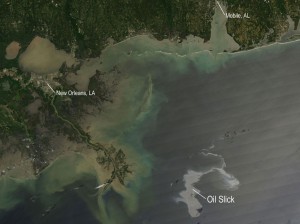
Deepwater Horizon Oil Spill as seen from space (Credit: NASA).
NASA and the consulting firm Deloitte LLP signed off on a joint partnership to provide advanced risk management capabilities to American oil and natural gas companies, such as Exxon Mobile and Hunt Oil. This partnership was formed through a Space Act Agreement on June 27th, 2013. Space and oil industries share similar risks such as dealing with remote operations, complex engineering, and operation under harsh and hostile environments.
“Activities like deep-water drilling, undersea production and pipeline operations all face the same kind of ‘black swan’ events that pose a threat to space exploration,” said David Traylor, a principal at Deloitte LLP. “Our strategic alliance with NASA will integrate the space agency’s 50-plus years of experience preventing and recovering from catastrophic accidents in human space flight into Deloitte’s advanced-risk strategies – applying state-of-science capabilities to oil and gas companies back here on earth.”
A black swan event is a highly improbable event that nonetheless carries catastrophic consequences. The term was popularized by Nassim Nicholas Taleb in his book The Black Swan.
One of the space industry’s core values is safety, which is required to conduct a successful mission. NASA applied risk-modeling and simulation techniques used to evaluate the potentially dangerous scenarios involved in using a Soyuz spacecraft to rescue a crew from the International Space Station (ISS). The space industry has had to gain deep knowledge and expertise in risk management and brings a comprehensive understanding of risk management, which is beneficial to the oil and gas sector. The specific fields that will be developed for potential customers through this strategic alliance include risk prediction, risk scenario modeling, tracking emerging trends, risk identification, and the promotion of risk awareness. The risk modeling and simulation services are intended to support oil and gas companies in their decision-making processes to minimize and avoid catastrophic failures, like the one that led to the loss of the Deepwater Horizon. In addition, the risk-management initiative will create tools to monitor and measure the success of individual programs like new site developments and new well technologies. According to John England, a partner with Deloitte, a wide range of energy companies has expressed interest for this service, no companies have been made public at this moment.
This is not the first time NASA and the oil industry have found common ground. NASA is looking to use sensors developed for underwater drilling to help monitor deep space and planetary missions. And space workers laid off from a downsizing NASA Johnson Space Center have long known that their skills – and safety know-how – will be welcomed in the Texan oil industry.
This strategic partnership between NASA and Deloitte may have the potential to expand beyond the oil and gas industry and into the commercialization of scientific techniques. These could include Fault Detection Isolation and Recovery (FDIR) analysis which is employed within the space sector for system operations.
NASA imagery below shows the progression of the Deepwater Horizon spill:
































![A trajectory analysis that used a computational fluid dynamics approach to determine the likely position and velocity histories of the foam (Credits: NASA Ref [1] p61).](https://www.spacesafetymagazine.com/wp-content/uploads/2014/05/fluid-dynamics-trajectory-analysis-50x50.jpg)



Leave a Reply